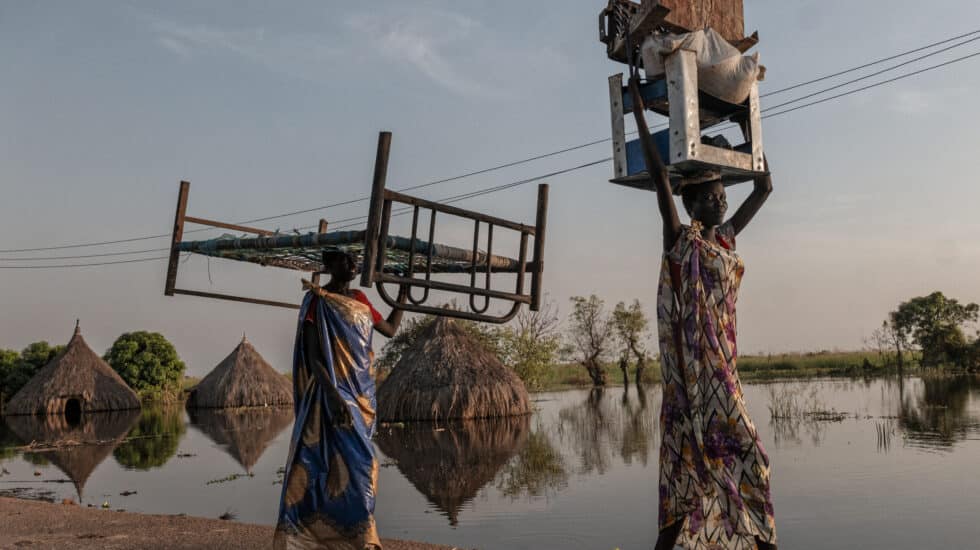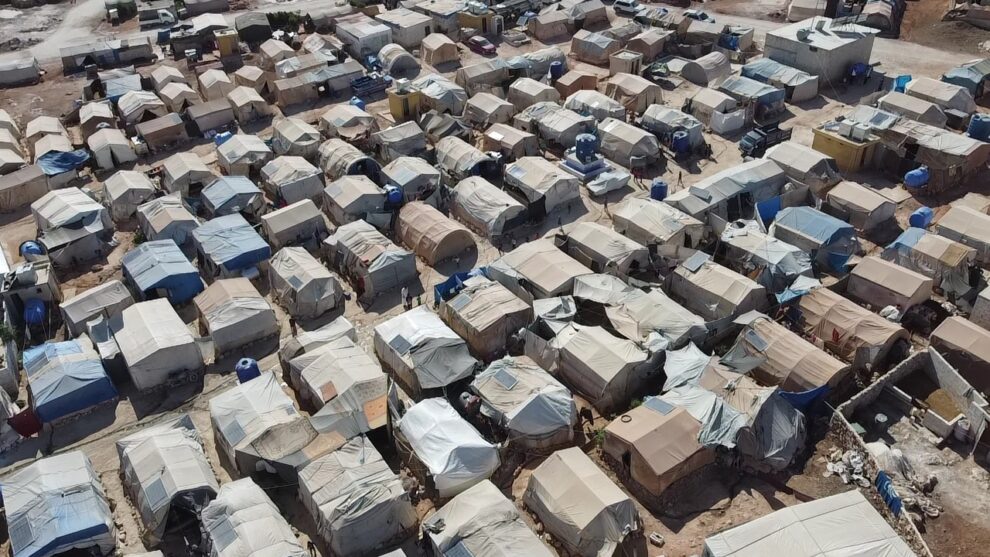

Women carry their belongings after flooding in South Sudan. Throughout Unity State, people’s homes and livelihoods (crops and cattle), as well as health facilities, schools and markets, are completely flooded by flood waters.
Spain’s humanitarian activities increased by 12.01% compared to 2020 figures, totaling €107.58 million, but this is “very far” from the figures achieved in the late 2000s and early 2010s, when the total Spanish humanitarian aid has reached 465 million euros, the Institute for Conflict Research and Humanitarian Action (IECAH) and Médecins Sans Frontières (MSF) denounced this Thursday.
In the report Humanitarian Action 2021-2022: After the War in Ukraine, both organizations detail the lack of investment in Official Development Assistance. Of these 107.58 million, 81.92 million belong to funds administered by the central public administration, and 25.65 million to funds contributed by decentralized cooperation, mainly autonomous communities and city halls. Of these, NGOs and civil society organizations sent 51.01%.
In terms of net Spanish official development assistance (ODA), in 2021 the total figure was 3,072.34 million euros, up 18% from the previous year and equal to 0.25% of GDP. still light years away from the 0.7% once dreamed of. And, on the other hand, the weight of humanitarian aid in relation to ODA in 2021 amounted to 3.5%, which in percentage terms is clearly lower than the 10% established in international recommendations.
However, both organizations emphasize that the recent passage of the Law on Cooperation for Sustainable Development and Global Solidarity does provide for achieving 0.7% of GDP for ODA by 2030, and of this 0.7%, at least 10% goes to humanitarian work.
In 2022, marked by the war in Ukraine, the report warns “as inequalities in funding and aid distribution widen year on year, with Ukraine being the clearest example of the double standards applied when it comes to allocating funds and resources to certain crises.
The case of Ukraine, the largest representative of the double standards that are applied when allocating funds and resources for certain crises
“The conflict in Ukraine has elicited a powerful response of solidarity, which is explained not only by the influence of the media or geopolitical factors, but also by the perception of geographic, cultural and socio-economic proximity. However, we must prioritize the principles of impartiality and independence in humanitarian action in order to help the people who need it most,” said Raquel Gonzalez Juarez, MSF Coordinator in Spain.
The different levels of coverage of crises reflect a very uneven focus between “noisy” crises, such as in Ukraine, and “forgotten” crises, such as in Ukraine. Afghanistan, Syria, Yemen or the Occupied Palestinian Territories. While some contexts attract the attention of the media and donors, others are ignored or soon forgotten. This media effect, together with geopolitical priorities, contributes to a shift in the direction of aid in one direction or another, more than the number of people affected by conflicts or their death rate.
Assistance to Ukraine is not in addition to current funding, to which it should be added that while Ukrainian refugees have been granted temporary access and protection in European countries, victims of other humanitarian crises have been denied the same rights. Our duty to care for the people of Ukraine should not be fulfilled by adequately supporting and protecting people in other crises,” says González Juarez. “It is imperative that we clearly advocate for humanitarian action worthy of the name and that it be based on the core ideas of humanity and impartiality,” he concludes.
On the global stage, international humanitarian funding totaled $31.3 billion in 2021, but as the two organizations highlight, the report does highlight that, despite the continued rise in humanitarian needs, this funding has only increased by 2.6% since 2018. and 2021. The number of people in need of humanitarian assistance increased in 2021 to 306 million. And according to the UNHCR Trend report presented in mid-November, they were exceeded in June 2022.

Climate crisis and arms proliferation
The stockpiling of covid-19 vaccines by developed countries, a clear sign of a lack of solidarity and blindness, has further increased the vulnerability of those who were already vulnerable. However, after overcoming the worst moments of the pandemic, the main threats to human security that the report highlights are, at least today, the climate emergency and the proliferation of weapons of mass destruction.
“The development of the war in Ukraine, already in the midst of the Russian escalation, in order to avoid the unfavorable outcome of its militaristic adventure by all means, may well lead us to a completely unknown scenario since the end of World War II,” says Jesús. A. Nunez Villaverde, co-director of IECAH.
Two major forgotten crises, such as the Cabo Delgado crisis in Mozambique and Tigray in Ethiopia, are a good example of how necessary it is to continue to fight for respect for international humanitarian law and thus continue to contribute daily as it effectively does to save lives and improve the situation of people affected by violence and armed conflict.
On the one hand, it has recently been five years since the outbreak of the conflict in Cabo Delgado in northern Mozambique, the escalation of which has been dizzying over the past two years. It is estimated that there are already about a million displaced people and more than 4,000 people have died, while in March 2020 the number of people affected by violence barely exceeded 150,000 people.
“Despite the increasingly complex conflict and the huge impact it has on the population, in some areas where MSF works in the north and center of the province, there are often no or very few organizations with a permanent presence,” says Aitor Zabalgoezakoa. Llodio, Head of Emergency Department, MSF Spain.
Source: El Independiente